Environmental & Life Science students benefit from a variety of exciting opportunities both in the field and laboratory. Take a look below to learn more about past and current student research.
Students in the Field
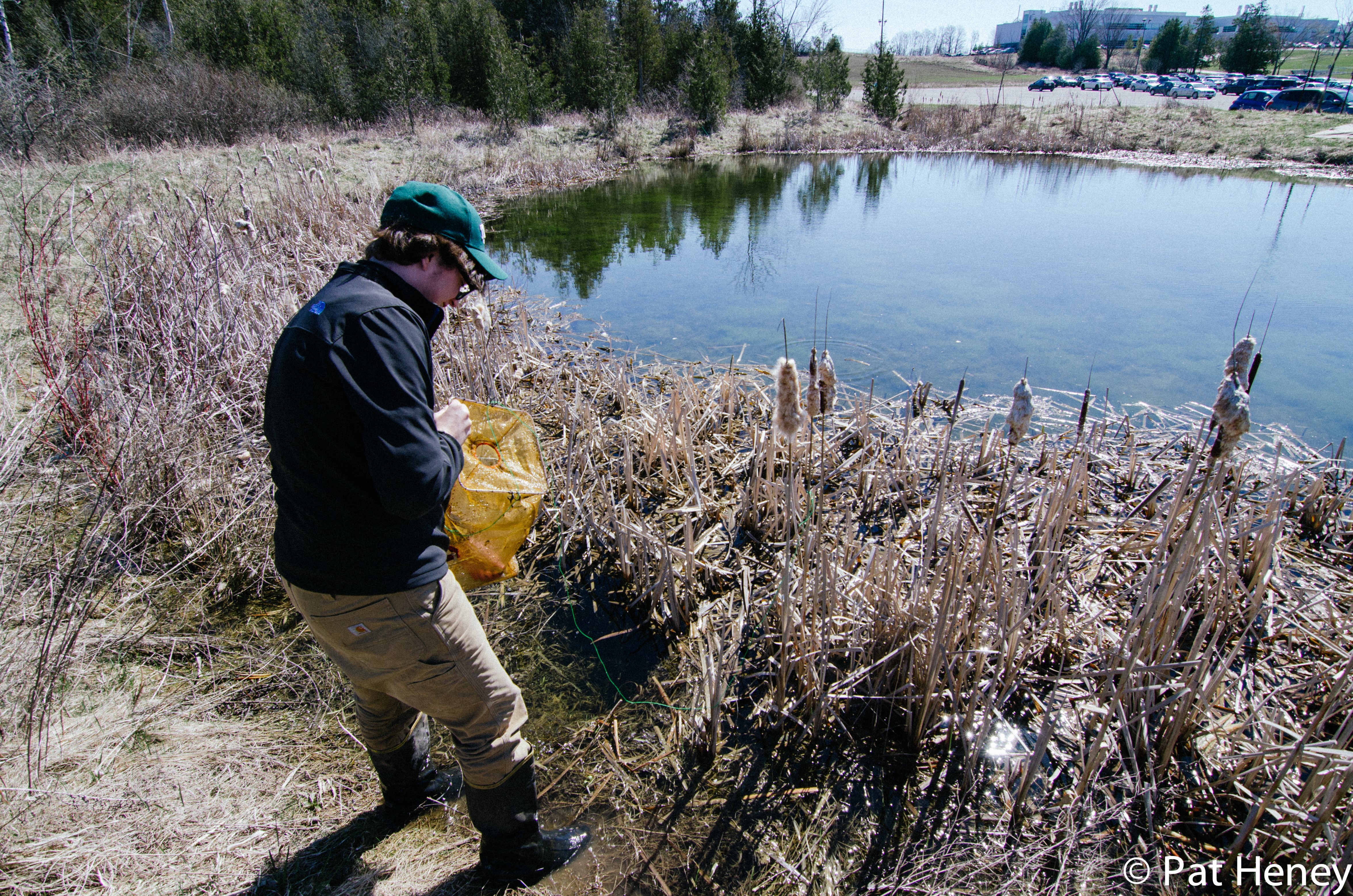 Patrick Heney, MSc candidate working on antipredator responses in larval salamanders, and his lab partner Jasper (LAST NAME) (pictured), are checking and replacing minnow traps, looking for blue-spotted salamanders that breed in ponds on the Trent campus. Once captured, the salamanders are kept in captivity for a few days to determine the maternity of the eggs that are laid by each female. This has implications for research involving the ploidy levels of specific larvae that hatch from each egg. Photograph taken April 2017.
Patrick Heney, MSc candidate working on antipredator responses in larval salamanders, and his lab partner Jasper (LAST NAME) (pictured), are checking and replacing minnow traps, looking for blue-spotted salamanders that breed in ponds on the Trent campus. Once captured, the salamanders are kept in captivity for a few days to determine the maternity of the eggs that are laid by each female. This has implications for research involving the ploidy levels of specific larvae that hatch from each egg. Photograph taken April 2017.
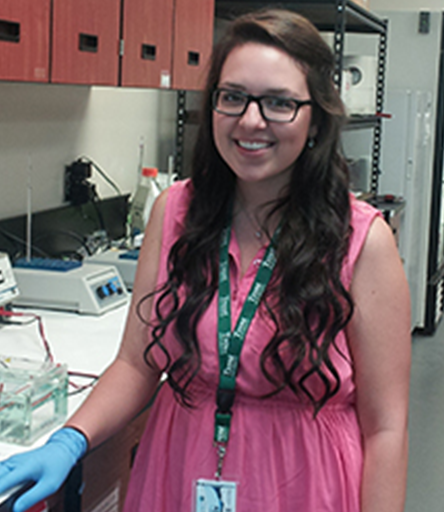 "I recently graduated from the Honours Forensic Science undergraduate program at Trent University in 2012, as one of the top students in my class. I was excited about studying at Trent at the graduate level in the Environmental & Life Sciences (EnLS) program. Trent has always been a place I can call home. I was delighted that the EnLS program offered a specialization in cell biology and genetics, as I have always had a keen interest in pursuing a career in forensic biology. I joined the Dr. Barry Saville lab in the summer of 2014, where my research focused on functional RNA molecules in a model fungal pathogen of corn. The EnLS program has provided numerous educational and social opportunities for me, as well as some lifelong friends. I have been awarded scholarships directly through this program, based on academic achievements. I am currently finishing writing my Master's thesis, while concurrently working as a Forensic Service Technologist at the Ontario Forensic Pathology Service in Toronto. I hope to finish writing and have defended my thesis before the new year! I am thankful for all opportunities that the EnLS program has provided, and can honestly say that I have had a very positive and rewarding graduate experience."
"I recently graduated from the Honours Forensic Science undergraduate program at Trent University in 2012, as one of the top students in my class. I was excited about studying at Trent at the graduate level in the Environmental & Life Sciences (EnLS) program. Trent has always been a place I can call home. I was delighted that the EnLS program offered a specialization in cell biology and genetics, as I have always had a keen interest in pursuing a career in forensic biology. I joined the Dr. Barry Saville lab in the summer of 2014, where my research focused on functional RNA molecules in a model fungal pathogen of corn. The EnLS program has provided numerous educational and social opportunities for me, as well as some lifelong friends. I have been awarded scholarships directly through this program, based on academic achievements. I am currently finishing writing my Master's thesis, while concurrently working as a Forensic Service Technologist at the Ontario Forensic Pathology Service in Toronto. I hope to finish writing and have defended my thesis before the new year! I am thankful for all opportunities that the EnLS program has provided, and can honestly say that I have had a very positive and rewarding graduate experience."
- Kristi Goulet, M.Sc. graduate student
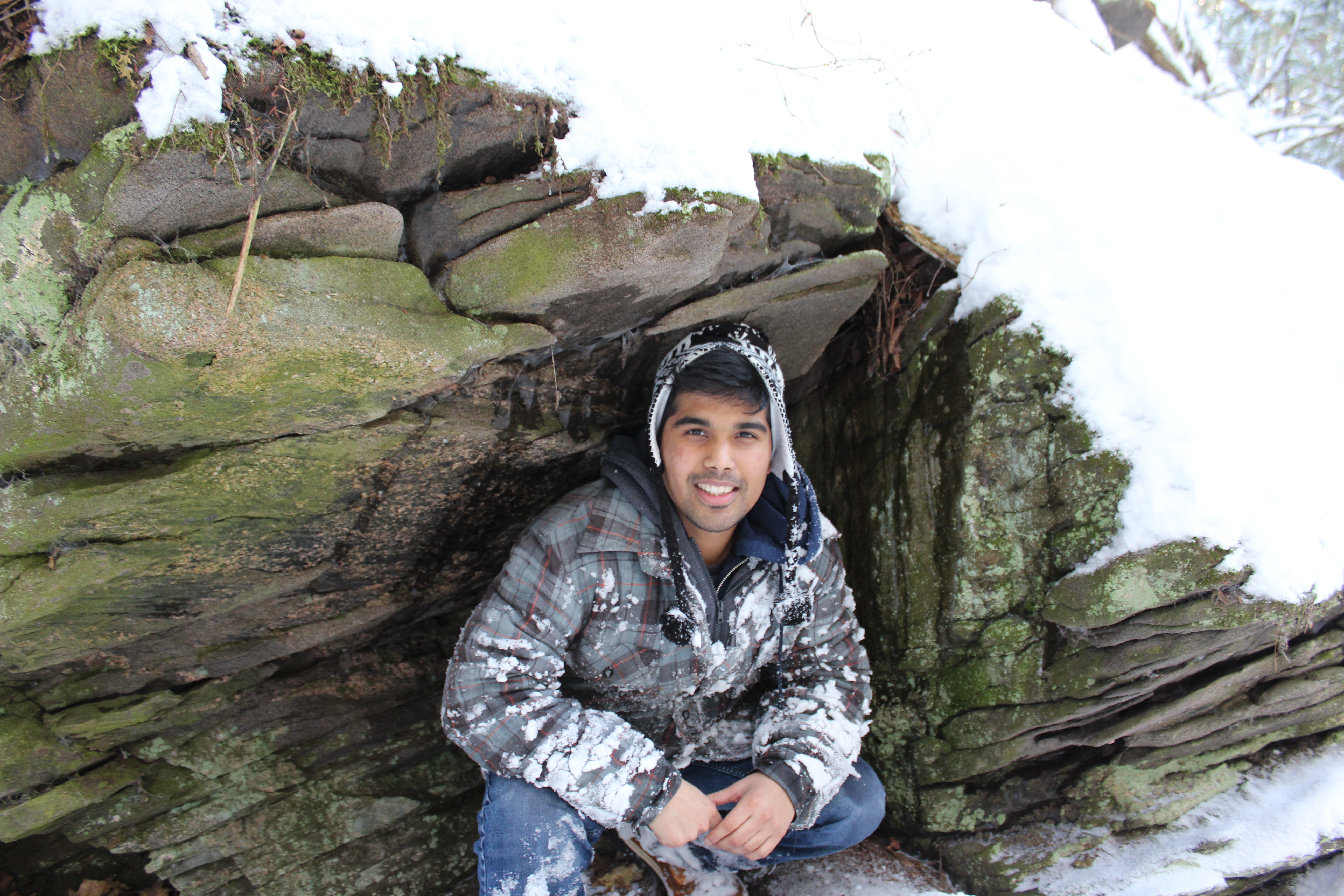 Vaughn Mangal, PhD candidate, explores how organic materials chemical makeup and concentration can influence mercury’s ability to be uptaken by bacteria at various times of the year. Mercury is a toxic metal of increasing importance that can travel in both the water and the atmosphere from various parts of world. Once in aquatic systems, mercury can be converted to the neurotoxin methylmercury by bacteria. Methylmercury magnifies up the food chain, resulting in greater concentrations in predatory fish and mammals that many Northern communities rely on for food. Vaughn received the prestigious W. Garfield Weston Award for Northern Research with a value of $50,000.
Vaughn Mangal, PhD candidate, explores how organic materials chemical makeup and concentration can influence mercury’s ability to be uptaken by bacteria at various times of the year. Mercury is a toxic metal of increasing importance that can travel in both the water and the atmosphere from various parts of world. Once in aquatic systems, mercury can be converted to the neurotoxin methylmercury by bacteria. Methylmercury magnifies up the food chain, resulting in greater concentrations in predatory fish and mammals that many Northern communities rely on for food. Vaughn received the prestigious W. Garfield Weston Award for Northern Research with a value of $50,000.
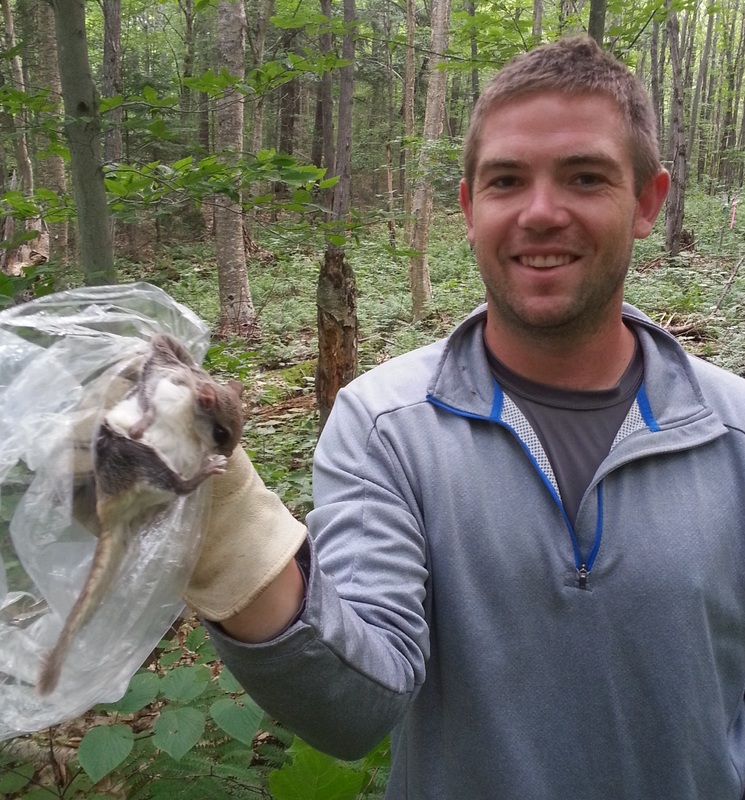 "The EnLS program at Trent University is a unique environment where many graduate students have the opportunity to collaborate on research projects with a variety of government agencies and organizations. This allows students to not only network with professionals in the field, but also to gain practical career experience. My research on functional genomics and ecology of hybridization in flying squirrels, supported by the Ontario Ministry of Natural Resources and Forestry (MNRF) and Trent University's ENLS program, has provided me with interdisciplinary training in bioinformatics and landscape ecology, along with valuable networking opportunities that will help me to succeed to in the field of natural resource science and management."
"The EnLS program at Trent University is a unique environment where many graduate students have the opportunity to collaborate on research projects with a variety of government agencies and organizations. This allows students to not only network with professionals in the field, but also to gain practical career experience. My research on functional genomics and ecology of hybridization in flying squirrels, supported by the Ontario Ministry of Natural Resources and Forestry (MNRF) and Trent University's ENLS program, has provided me with interdisciplinary training in bioinformatics and landscape ecology, along with valuable networking opportunities that will help me to succeed to in the field of natural resource science and management."
- Michael Brown, M.Sc. graduate student
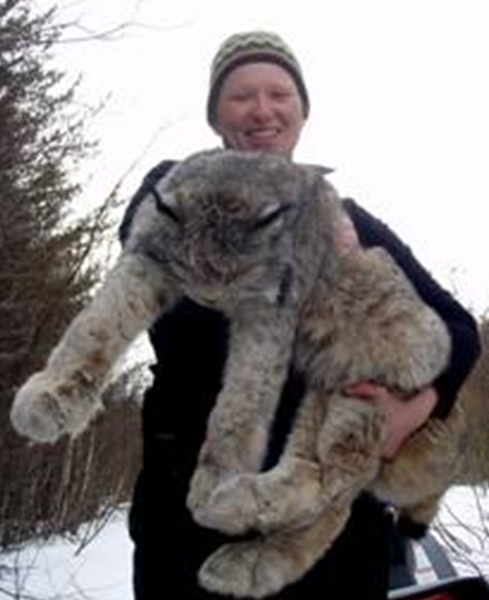 Meagan Hornseth, M.Sc. graduate student, focuses her research on determining the impacts of habitat fragmentation and landscape connectivity on Canada lynx at multiple spatial scales. Lynx are declining in the southern boreal forest, which is becoming increasingly fragmented due to forestry and road development. Meagan is examining the implications of habitat fragmentation on the behavioural plasticity of lynx across its range and determining the effects of habitat fragmentation on broad scale movements and developing a sustainable harvest model for lynx in Ontario.
Meagan Hornseth, M.Sc. graduate student, focuses her research on determining the impacts of habitat fragmentation and landscape connectivity on Canada lynx at multiple spatial scales. Lynx are declining in the southern boreal forest, which is becoming increasingly fragmented due to forestry and road development. Meagan is examining the implications of habitat fragmentation on the behavioural plasticity of lynx across its range and determining the effects of habitat fragmentation on broad scale movements and developing a sustainable harvest model for lynx in Ontario.
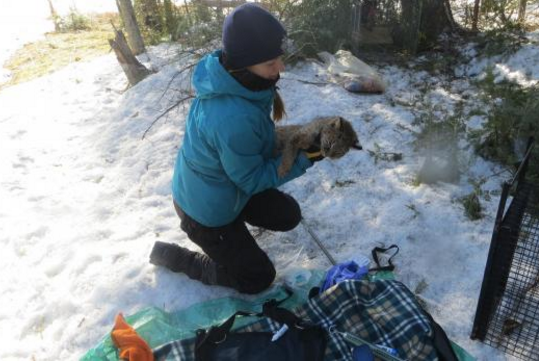 “I was drawn to Trent because of its close-knit community and collaborative atmosphere, as well as the beautiful campus setting. Trent has helped me find my footing through providing various resources, as well as a welcoming and inspiring research environment.” Samantha Morin says that it was the support she received at Trent that equipped her with the resources necessary to bring her research project to a reality. Ms. Morin’s passion for wildlife sparked a focus on the Canada lynx and bobcat, studying the interactions between the two species and understanding more of their ecology. She says that she has found her place here at Trent University, and a group of colleagues that have provided the time, resources and opportunities necessary to carry out this exciting assignment.
“I was drawn to Trent because of its close-knit community and collaborative atmosphere, as well as the beautiful campus setting. Trent has helped me find my footing through providing various resources, as well as a welcoming and inspiring research environment.” Samantha Morin says that it was the support she received at Trent that equipped her with the resources necessary to bring her research project to a reality. Ms. Morin’s passion for wildlife sparked a focus on the Canada lynx and bobcat, studying the interactions between the two species and understanding more of their ecology. She says that she has found her place here at Trent University, and a group of colleagues that have provided the time, resources and opportunities necessary to carry out this exciting assignment.
- Samantha Morin, M.Sc. graduate student
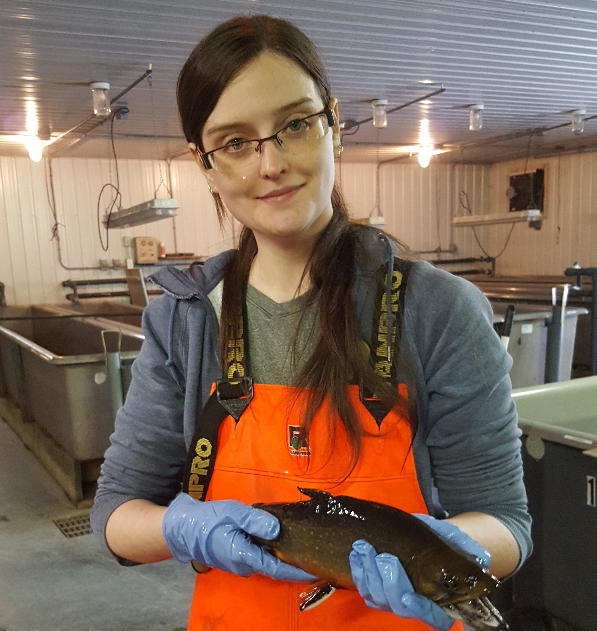 Chantelle Penney, PhD candidate, investigates transgenerational plasticity and epigenetic inheritance in lake trout and brook trout by examining their physiological and behavioural responses to a warmer environment. This involves measurements of metabolic rate, temperature preference and gene expression to determine whether there is potential for future generations of these fish to cope with the anticipated warming associated with climate change.
Chantelle Penney, PhD candidate, investigates transgenerational plasticity and epigenetic inheritance in lake trout and brook trout by examining their physiological and behavioural responses to a warmer environment. This involves measurements of metabolic rate, temperature preference and gene expression to determine whether there is potential for future generations of these fish to cope with the anticipated warming associated with climate change.
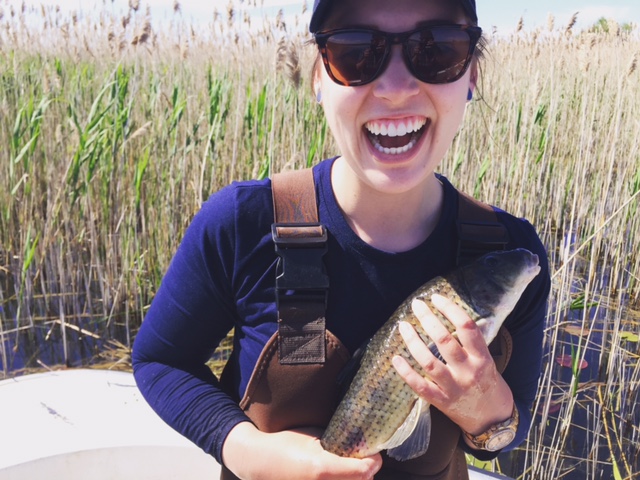 "The passion that the students have for their research is both contagious and inspiring"
"The passion that the students have for their research is both contagious and inspiring"
-Abby Wynia, M.Sc. graduate student
 Melanie Boudreau, PhD candidate, focuses on the non-consumptive effects of predation in snowshoe hare populations. "I am grateful for the opportunities I have had through the Murray lab, from being able to work in the beautiful remote wilderness of the Yukon for 18 months to building and being a part of an amazing supportive and productive collaborative network; all of it has been an exceptional experience to date."
Melanie Boudreau, PhD candidate, focuses on the non-consumptive effects of predation in snowshoe hare populations. "I am grateful for the opportunities I have had through the Murray lab, from being able to work in the beautiful remote wilderness of the Yukon for 18 months to building and being a part of an amazing supportive and productive collaborative network; all of it has been an exceptional experience to date."
Three Minute Thesis Presentations
- Hannah Mackellar - First Runner Up - "Characterizing Migration in Hudson Bay’s Whimbrel Population"
- Megan Aoki - "The Role of Plant Hormones in the Social Amoeba, Dictyostelium"
- Rachel Dillon - "Ophidiomycosis: A Forked Road in Snake Conservation"
- Sam Sonnega - "Snowshoe Hares in a Changing Environment"

